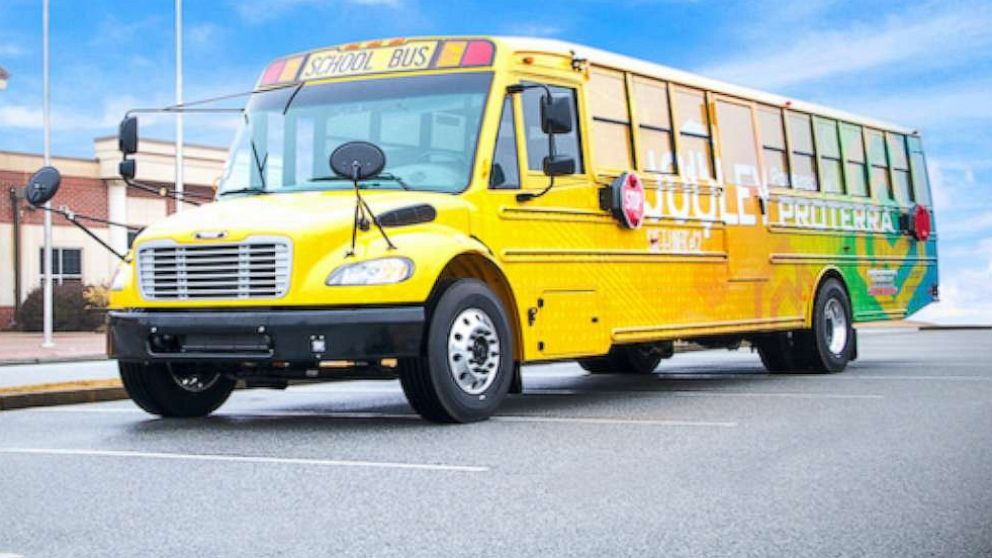Maryland school district replacing diesel school buses with electric
Maryland's Montgomery County Public Schools announced a contract to replace its diesel buses with electric ones, starting with 326 electric buses over the next four years. It marks the single largest purchase of electric school buses in North America, according to the release announcing the deal.
The county school board, which is located northwest of Washington, D.C., and operates more than 200 schools, approved the deal with Highland Electric Transportation, a Massachusetts-based start-up that delivers electric school buses to school districts.
Although this contract only replaces about a quarter of the entire 1,400 bus fleet, the contract could be extended to replace the entire fleet, according to Todd Watkins, the Transportation Director for Montgomery County Public Schools.
"The reason we picked four years instead of the entire contract is that the whole school bus industry thinks that prices on electric vehicles are going to be going down significantly as we saw with Tesla," Watkins told ABC News Radio.
Watkins said the district got several proposals but ultimately went with Highland Electric because they provided everything they wanted as part of the contract.
"We asked for use of the vehicle, design, installation, and maintenance of the charging infrastructure, we asked for the electric the buses run on and we asked for maintenance of the buses," said Watkins.

Nat Kreamer, CEO of Advanced Energy Economy, a national clean energy business group, applauded the announcement in a statement.
"This leadership step taken by Montgomery County Public Schools shows that it's possible today to electrify transportation at scale. Comprehensive solutions like Highland Electric's can leverage private capital, meet the needs of fleet operators, and serve communities now without burdening ratepayers or taxpayers," said Kreamer.
As part of the deal, Highland Electric will purchase the buses from Thomas Built Buses in North Carolina. It will be supplied and serviced by Annapolis, Maryland-based American Bus- a long-time provider for the school district. Thomas Built will use its all-electric Saf-T-Liner C2 Jouley school bus and it will be powered by Proterra batteries. The buses are capable of up to 135 miles range on a single charge.
Highland Electric will also electrify all five of the MCPS bus depots and supply all the charging infrastructure, with the goal of purchasing 100% renewable energy to power them over time.
Duncan McIntyre, CEO of Highland Electric, said he believes the county chose the company because they were able to make the contract budget-neutral.
"We're looking at their capital that they've got available and their operating expenses that they expect to spend over the next 10 to 15 years to operate a diesel fleet, and we're sort of shifting that around and making the bet with our money. We're making the bet that electric buses are much cheaper to operate, and so there's a shift, we're willing to pay a lot more because we're making a bet that savings will materialize," McIntyre told ABC News Radio.
One common concern for customers is what the price of electricity will be down the road. McIntyre said they are the ones taking the risk of the costs when they bundle future prices into the annual contract.
"For the district, it's a win-win. They get to wash their hands of it. What they know is they get 16,000 miles per year per bus, because that's how many miles they need to drive. And it's our obligation to power up the buses every night, [or the] middle of the day, and create an optimized strategy that gives them charge readiness for their routes," said McIntyre.
The company plans to deliver 25 buses this fall, before ramping up to 61 in 2022, then around 120 each of the next two years. Watkins says it will take 14 years to completely electrify the entire fleet.
The move to electric buses also gets rid of dangerous carbon emissions, Watkins said.
"We know that whatever impact there is of diesel exhaust on students riding our buses, or being in school driveways, while those are much, much less than they were 20 years ago ... there's still some greenhouse gases. There's still some particulate matter and still burns fossil fuels," Watkins said.
When the buses are not in use, especially during the summer when school is out, the batteries can provide energy to the electrical grid.
"We've been doing that for a few years and have a number of vehicle to grid projects that are primarily smaller. But we're making a bet that we can earn some income," McIntyre said.



